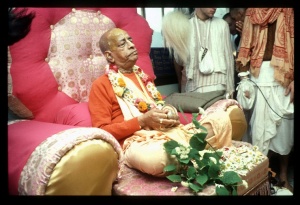CC Adi 11.51

A.C. Bhaktivedanta Swami Prabhupada
TEXT 51
- kaṁsāri sena, rāmasena, rāmacandra kavirāja
- govinda, śrīraṅga, mukunda, tina kavirāja
SYNONYMS
kaṁsāri sena — Kaṁsāri Sena; rāmasena — Rāmasena; rāmacandra kavirāja — Rāmacandra Kavirāja; govinda — Govinda; śrīraṅga — Śrīraṅga; mukunda — Mukunda; tina kavirāja — all three are Kavirājas, or physicians.
TRANSLATION
The fifty-eighth great devotee of Lord Nityānanda Prabhu was Kaṁsāri Sena, the fifty-ninth was Rāmasena, the sixtieth was Rāmacandra Kavirāja, and the sixty-first, sixty-second and sixty-third were Govinda, Śrīraṅga and Mukunda, who were all physicians.
PURPORT
Śrī Rāmacandra Kavirāja, the son of Khaṇḍavāsī Cirañjīva and Sunanda, was a disciple of Śrīnivāsa Ācārya and the most intimate friend of Narottama dāsa Ṭhākura, who prayed several times for his association. His youngest brother was Govinda Kavirāja. Śrīla Jīva Gosvāmī very much appreciated Śrī Rāmacandra Kavirāja’s great devotion to Lord Kṛṣṇa and therefore gave him the title Kavirāja. Śrī Rāmacandra Kavirāja, who was perpetually disinterested in family life, greatly assisted in the preaching work of Śrīnivāsa Ācārya and Narottama dāsa Ṭhākura. He resided at first in Śrīkhaṇḍa but later in the village of Kumāra-nagara, on the bank of the Ganges.
Govinda Kavirāja was the brother of Rāmacandra Kavirāja and youngest son of Cirañjīva of Śrīkhaṇḍa. Although at first a śākta, or worshiper of goddess Durgā, he was later initiated by Śrīnivāsa Ācārya Prabhu. Govinda Kavirāja also resided first in Śrīkhaṇḍa and then in Kumāra-nagara, but later he moved to the village known as Teliyā Budhari, on the southern bank of the river Padmā. Since Govinda Kavirāja, the author of two books, Saṅgīta-mādhava and Gītāmṛta, was a great Vaiṣṇava kavi, or poet, Śrīla Jīva Gosvāmī gave him the title Kavirāja. He is described in the Bhakti-ratnākara (Ninth Wave).
Kaṁsāri Sena was formerly Ratnāvalī in Vraja, as described in the Gaura-gaṇoddeśa-dīpikā (194 and 200).